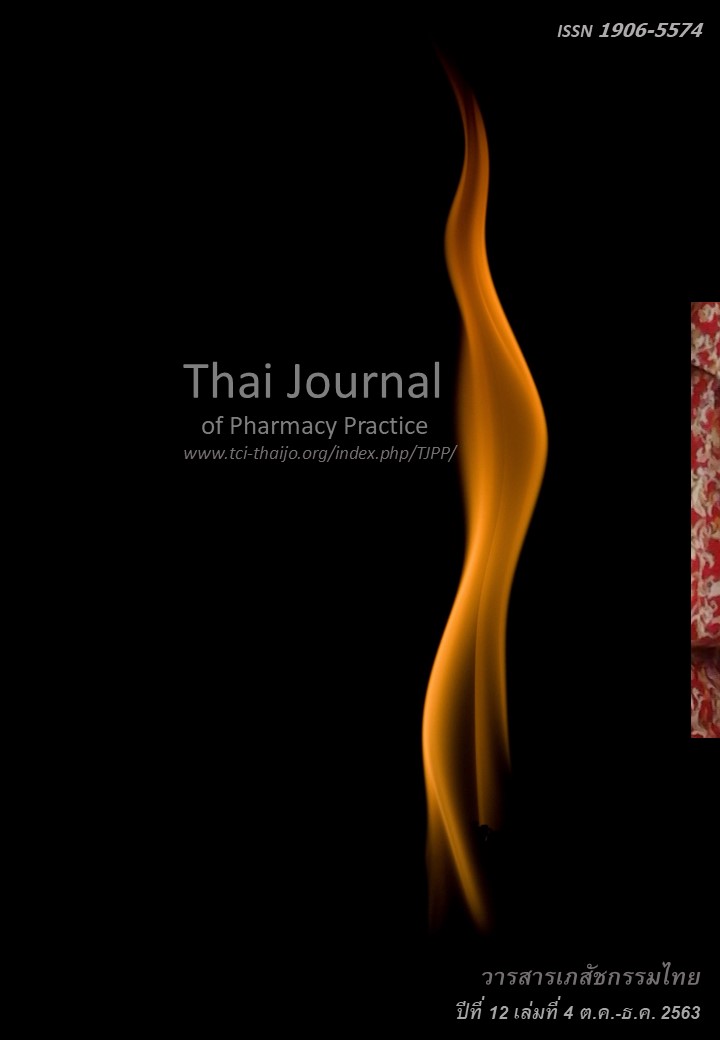ผลของการสอนแบบดั้งเดิมที่บูรณาการกับกิจกรรมการเรียนรู้เชิงรุกโดยใช้ชุมชนเป็นฐานต่อทักษะ ทางเภสัชกรรมคลินิกและทักษะทางอารมณ์ของนิสิตเภสัชศาสตร์ชั้นปีที่ 3 มหาวิทยาลัยมหาสารคาม
Main Article Content
บทคัดย่อ
วัตถุประสงค์: เพื่อประเมินผลของการสอนที่ใช้กิจกรรมการเรียนรู้เชิงรุกโดยใช้ชุมชนเป็นฐานต่อทักษะทางเภสัชกรรมคลินิก ทักษะทางอารมณ์ และความคิดเห็นของนิสิตและอาจารย์เกี่ยวกับการจัดการเรียนการสอนในนิสิตเภสัชศาสตร์ชั้นปีที่ 3 มหาวิทยาลัยมหาสารคาม วิธีการ: การศึกษานี้เป็นแบบกึ่งทดลอง เก็บข้อมูลในภาคการศึกษาที่ 2/2561 ในนิสิตเภสัชศาสตร์ชั้นปีที่ 3 จำนวน 100 คนที่ได้รับความรู้ภาคบรรยายและฝึกปฏิบัติในชั้นเรียนเกี่ยวกับการซักประวัติผู้ป่วยและเภสัชกรรมบำบัดเบื้องต้น จากนั้นนิสิตได้เข้าร่วมกิจกรรมการเรียนรู้เชิงรุกโดยใช้ชุมชนเป็นฐาน คือ การเยี่ยมบ้านผู้ป่วยที่มีโรคเรื้อรังจำนวน 2 ครั้ง (ห่างกัน 1 เดือน) การศึกษาประเมินทักษะทางเภสัชกรรมคลินิกด้วยวิธีการสอบ OSCE (objective structured clinical examination) ที่กลางและปลายภาคการศึกษา และประเมินทักษะทางอารมณ์ด้วยแบบสอบถามชนิดตอบด้วยตนเอง 2 ครั้ง คือก่อนและหลังการจัดการเรียนการสอน ในปลายเทอมเก็บข้อมูลเชิงคุณภาพเพื่อศึกษาความคิดเห็นที่มีต่อการจัดการเรียนการสอนด้วยวิธีการอภิปรายกลุ่มจำนวน 3 ครั้งโดยมีกลุ่มตัวอย่าง คือ ตัวแทนนิสิต 2 ครั้ง (n =12 คน) และอาจารย์ผู้สอน 1 ครั้ง (n=4) ผลการวิจัย: คะแนนเฉลี่ยทักษะทางเภสัชกรรมคลินิกที่ปลายภาคลดลงจากกลางภาค (กลางภาค = 96.98±5.07, ปลายภาค=88.28±7.57, P<0.001) นิสิตมีคะแนนทักษะการค้นข้อมูลจากตำราและการคำนวณเพิ่มขึ้น (กลางภาค =15.50 ± 3.49, ปลายภาค=20.42 ± 2.38, P<0.001) นิสิตมีคะแนนทักษะทางอารมณ์เพิ่มขึ้นจาก 3.73±0.39 เป็น 3.90±0.38 (P<0.001) กลุ่มตัวอย่างอาจารย์และนิสิตเห็นว่า กิจกรรมการเรียนรู้เชิงรุกโดยใช้ชุมชนเป็นฐานช่วยส่งเสริมให้นิสิตมีทักษะทางอารมณ์และทักษะทางคลินิกที่ดีขึ้น สรุป: การสอนร่วมกับกิจกรรมการเรียนรู้เชิงรุกโดยใช้ชุมชนเป็นฐานมีส่วนสำคัญที่ช่วยเพิ่มพูนทักษะทางอารมณ์และความมั่นใจในการเรียน อย่างไรก็ตาม การเพิ่มพูนทักษะทางเภสัชกรรมคลินิกสำหรับนิสิตเภสัชศาสตร์อาจจะต้องใช้เวลา ดังนั้นการจัดการเรียนการสอนสำหรับนิสิตจำเป็นต้องมีแบบการเรียนรู้เชิงรุกและประเมินผลอย่างต่อเนื่องตลอดการศึกษา
Article Details
ผลการวิจัยและความคิดเห็นที่ปรากฏในบทความถือเป็นความคิดเห็นและอยู่ในความรับผิดชอบของผู้นิพนธ์ มิใช่ความเห็นหรือความรับผิดชอบของกองบรรณาธิการ หรือคณะเภสัชศาสตร์ มหาวิทยาลัยสงขลานครินทร์ ทั้งนี้ไม่รวมความผิดพลาดอันเกิดจากการพิมพ์ บทความที่ได้รับการเผยแพร่โดยวารสารเภสัชกรรมไทยถือเป็นสิทธิ์ของวารสารฯ
เอกสารอ้างอิง
Pharmacy Council of Thailand. Pharmacy council announcement 18th/2012 on pharmacy core competency in Pharm.D. curriculum [online]. 2012 [cited Aug 20, 2019]. Available from: www.pharma cycouncil.org/share/file/file_265. Pdf
Third WHO Consultative Group on the Role of the Pharmacist. Preparing the future pharmacist: curricular development [online]. 1997 [cited Dec 4, 2019]. Available from: apps.who.int/medicinedocs/ pdf/s2214e/s2214e.pdf
Fitzgerald RJ. Medication errors: the importance of an accurate drug history. Br J Clin Pharmacol. 2009; 67: 671–75.
Rovers J, Miller MJ, Koenigsfeld C, Haack S, Hegge K, McCleeary E. A guided interview process to improve student pharmacists' identification of drug therapy problems. Am J Pharm Educ 2011; 75: 16.
Mesquita AR, Souza WM, Boaventura TC, Barros IM, Antoniolli AR, Silva WB, et al. The effect of active learning methodologies on the teaching of pharma ceutical care in a Brazilian pharmacy faculty. PLoS One 2015; 10:e0123141.
Holmes B. Hone the top 5 soft skills every college student needs [online]. 2014. [cited May 14, 2019]. Available from: www.usnews.com/education/blogs/ college-admissions-playbook/2014/05/12/hone-the-top-5-soft-skills-every-college-student-needs.
Luiz Adrian JA, Zeszotarski P, Ma C. Developing pharmacy student communication skills through role-playing and active learning. Am J Pharm Educ. 2015; 79: 44.
Stewart DW, Brown SD, Clavier CW, Wyatt J. Active-learning processes used in US pharmacy education. Am J Pharm Educ 2011; 75: 68.
Pires C, Cavaco A. Scoping pharmacy students' learning outcomes: where do we stand?. Pharmacy (Basel) 2019;7:23.
Awaisu A, Abd Rahman NS, Nik Mohamed MH, Bux Rahman Bux SH, Mohamed Nazar NI. Malaysian pharmacy students' assessment of an objective structured clinical examination (OSCE). Am J Pharm Educ 2010; 74: 34.
Nealy C. Integrating soft skills through active learning in the management classroom. J Coll Teach Learn 2005;2: 1-6.
Ibrahim M. The use of community based learning in educating college students in Midwestern USA. Procedia- Social and Behavioral Sciences 2010; 2: 392-6.
Pearson ML, Hubball HT. Curricular integration in pharmacy education. Am J Pharm Educ 2012; 76: 204.
Kongmanklang V. What is the integrated learning method? [online]. 2012 [cited May 14, 2019] Availa ble www.gotoknow.org/posts/400257.
Kanjanasilp J. Integrative pharmacy education for health promotion: innovative models for producing new blood pharmacists [abstract]. In Office of the Education Council. Proceedings of the 15th National Symposium on Educational Research; 2013 Jun 23-25; Bangkok, Thailand. Bangkok: Office of the Education Council; 2013.
Gleason BL, Peeters MJ, Resman-Targoff BH, Karr S, McBane S, Kelley K, et al. An active-learning strategies primer for achieving ability-based educa tional outcomes. Am J Pharm Educ 2011; 75: 186.
Rickles NM, Tieu P, Myers L, Galal S, Chung V. The impact of a standardized patient program on student learning of communication skills. Am J Pharm Educ 2009; 73: 4.
Smith L, Krass I, Sainsbury E, Rose G. Pharmacy students' approaches to learning in undergraduate and graduate entry programs. Am J Pharm Educ 2010; 74: 106.
Ngounjinda N, Singsathit A, Sriphong P, Sutthiruksa S. Effect of integrated learning on learning outcome of pharmacy students. Isan Journal of Pharmaceu tical Sciences 2017; 13: 28-36.
Tan CE, Jaffar A, Tong SF, Hamzah MS, Mohamad N. Comprehensive healthcare module: medical and pharmacy students' shared learning experiences. Med Educ Online. 2014; 19: 25605.
O'Brien CE, Flowers SK, Stowe CD. Desirable skills in new pharmacists: a comparison of opinions from practitioners and senior student pharmacists. J Pharm Pract 2017; 30: 94-8.


